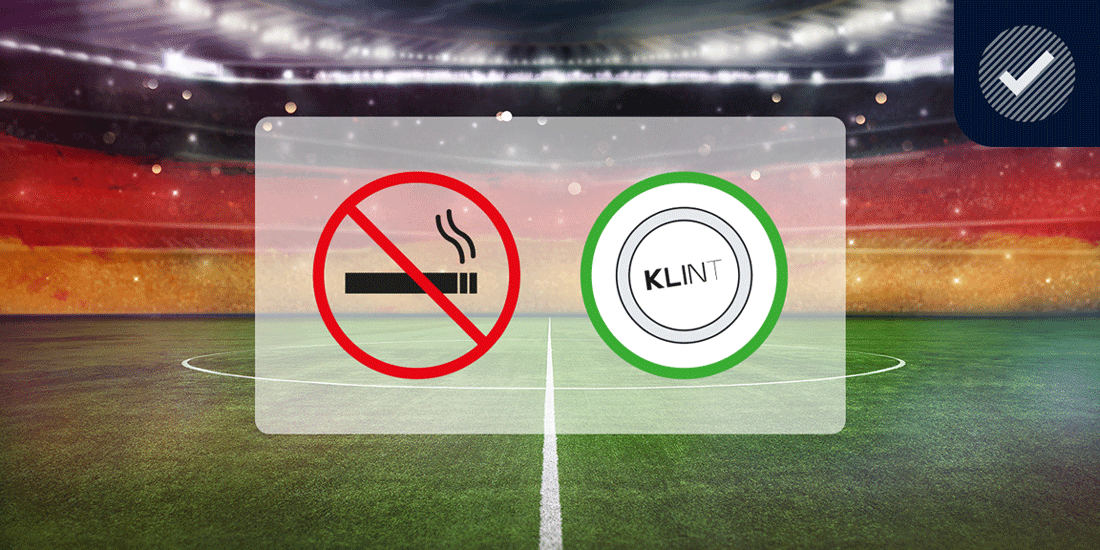The 2024 European Football Championship is just around the corner. Some may be wondering: Is smoking allowed in the stadium? What rules apply in principle and in particular for Euro 2024? And do you have to give up cigarettes, perhaps even vapes altogether - are you actually allowed to consume Snus in the stadium? To make sure you don't get a "red card" as a stadium visitor, we've done some research and summarized the most important information below. You can also read what Snus has to do with soccer and how well-known footballers (could) justify their consumption.
Is smoking allowed in the stadium?
Whether it's Diego Maradona with a cigar in the stands or Maurizio Sarri and Ernst Happel in the technical area constantly alternating with a new cigarette - these are images that are all too familiar from the past. And back then, nobody in the audience had any qualms about lighting up a cigarette.
However, with the introduction of non-smoker protection laws and the first smoking bans in Europe, the issue of smoking in stadiums took a noticeable turn, prompting soccer associations and clubs across Europe to consider smoking bans at matches and new guidelines for the protection of non-smokers. You may remember the discussions at Hamburger SV in 2008 about the "first completely smoke-free arena". Or later, the 2014/15 UEFA Champions League final between Juventus and FC Barcelona - where the motto was: smoke-free zone in all indoor and outdoor areas of the Olympic Stadium. And today's "Directive on tobacco-free areas in the stadium" even defines the gold standard, according to which not only a general smoking ban on the stadium grounds without smoking areas is intended in the interests of health protection, but even sales and advertising on the grounds are prohibited.
Although much has been done in this area, there are still no uniform, strict rules covering all soccer stadiums. This is also the reason why in some Bundesliga stadiums a smoking ban is still just smoke and mirrors and at least smoking areas invite people to enjoy a fag.
At least UEFA knows how to make a clear statement in response to this, as it is their area of responsibility. According to UEFA, allowing smoking, even in outdoor areas, would jeopardize the separation of sport and tobacco products. Either way, it leaves little room for maneuver for the upcoming European Championship 2024.
 |
For UEFA, it seems clear that tobacco and football do not go together. - © Image: AdobeStock |
EURO 2024 stadium regulations leave no leeway for smokers
It has been announced - now it seems to be a done deal: the European Championship stadiums are to be smoke-free. The exact wording from the UEFA:
"All EURO 2024 stadiums will be smoke-free. Therefore, smoking, the use of e-cigarettes and heated, non-burning tobacco products is not permitted. Please be considerate of other fans."
So whether at the opening match in the Allianz Arena in Munich, in Deutsche Bank Park (Frankfurt Arena) for Germany's final preliminary round match against Switzerland, in the Olympic Stadium in Berlin or in other arenas that will host European Championship matches - they should all remain a smoke-free zone.
You might guess that there could be exceptions if you look at the official stadium regulations take a closer look. Point 4.2.I refers to possible smoking areas designated in accordance with applicable law, which may permit exceptions. Using the Allianz Arena as an example, this could refer to designated areas on levels 4 and 5, on the Esplanada and the stadium promenades, as was/is the practice at least at other matches.
But it remains questionable whether there will actually be such stadiums if the strict wording refers to smoke-free stadiums and if, in the example of Munich, the following announcement is made on the official website of the European Championship organizer at the same time:
"Even if you regularly go to the Munich Football Arena, some things might be different in the stadium at EURO 2024 and the rules might be different to what you are used to."
If there are to be exceptions, it remains to be seen how this could be reconciled with the aforementioned endangered separation of sport and tobacco products - as argued by UEFA. It would also contradict the desired gold standard (no smoking areas on the grounds) and even more so the definition of "smoke-free" in these guidelines on tobacco-free stadiums (see p. 10), which could be given a lot of weight in the context of hosting a European Championship, and not just for PR reasons.
One thing is certain: smoking on the grounds will only be possible if there are designated zones.
Is there a risk of being banned from the stadium if the smoking ban is violated?
Point 3.5 of the European Championship stadium regulations provides information on whether there is a risk of a "red card" and even expulsion from the stadium if the above rules are disregarded. It states:
"Persons who do not comply with the stadium regulations or who pose a security risk will not be admitted to the [...] or will be expelled from the stadium. This is without prejudice to other measures that may be taken against such persons."
Such possible stadium expulsions are underpinned under point 6.1. If the smoking ban is violated, the game could actually be over for spectators sooner than one would like.
But what about the issue of Snus and tobacco-free nicotine pouches? Can they be consumed without coming into conflict with existing stadium rules?
Is Snus prohibited in the stadium?
The current UEFA stadium regulations do not explicitly prohibit the consumption of snus - rather, they contain restrictions on smoking. However, oral tobacco is mentioned in the main guidelines for sports clubs and/or stadium operators on the adoption of a tobacco control policy (see the aforementioned guidelines on tobacco-free stadiums) by the wording "smokeless tobacco products such as oral tobacco". In the spirit of the defined gold standard "tobacco-free" recommended there on page 11, the sale and use of Snus in the stadium are even explicitly prohibited.
However, as this does not appear to be a fixed set of rules for the European Championship and its stadiums, and the focus is more on the recommendation with the aim of achieving a gold standard, there is not yet a generally applicable ban on Snus in the stadium.
In addition, consumption in Germany - or private use in small quantities - is not illegal. Only the sale and placing on the market are explicitly prohibited.
It can therefore be concluded that the consumption of Snus in the stadium is not generally prohibited. In any case, you will be well served if you look at the individual house rules of the respective stadium before the game and check whether a possibly valid gold standard could apply.
In any case, you can play it safe by switching to an alternative that is also very popular in Germany - namely tobacco-free nicotine pouches. This way, you also avoid all possible rules concerning tobacco-free stadiums.
Snus in soccer
Most professional soccer players are already familiar with them and many also use them - Snus and tobacco-free nicotine pouches are setting an ever-growing trend in soccer. According to a statement made by an SC Freiburg player to NDR, they are even consumed by a quarter of all Bundesliga players. But why is this the case and how is consumption in professional sport justified?
The Snus Effect is certainly one of the main reasons why Snus are used in soccer. After all, mental and physical performance enhancement, concentration promotion and stress reduction - typical of consumption - are considered desirable effects among football players. If, for example, Jamie Vardy, Victor Lindelöf or Jamaal Lascelles reach for nicotine pouches before the game - as is known from various media - it is perhaps precisely for this reason - it is therefore about increasing performance and improving concentration. What's more, this form of nicotine consumption is smoke-free and does not damage the lungs.
>> In which other sports snus consumption is popular and how studies link a measurable increase in performance with consumption, you can read in: Whether in ice hockey or football - why are snus so popular in sports?
As Kick.Tv also states in an online article, "cultural and social factors" are also responsible for a steadily growing trend. Specifically, it is said that the influx of Scandinavian players - among whom consumption is part of their culture - into European leagues is increasingly bringing other players into contact with the products.
A statement from Marcel Thomas from as early as 2018 about his time in the second team at VfL Bochum (2011-2013) would probably back this up. At the time, he said that he had been offered the alleged miracle cure by a Scandinavian Bundesliga player and had been taking it regularly ever since.

























